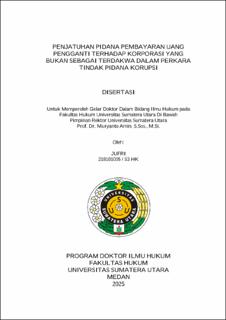Penjatuhan Pidana Pembayaran Uang Pengganti terhadap Korporasi yang Bukan Sebagai Terdakwa dalam Perkara Tindak Pidana Korupsi
Imposing Criminal Penalties in the Payment of Substitute Money to Corporations That Are Not Defendants in Corruption Cases

Date
2025Author
Jufri, Jufri
Advisor(s)
Danil, Elwi
Yunara, Edi
Sukarja, Detania
Metadata
Show full item recordAbstract
Court judges play an important role in handing down criminal verdicts in corporate corruption cases to recover state losses. This normative research discusses the imposition of substitute financial penalties, the basis for judges' considerations in imposing substitute financial penalties on corporations that are not defendants, and the concept of imposing corporate corruption penalties in the future. Conclusion: First, the imposition of a criminal penalty in the form of compensation in corruption cases can be carried out against corporations and/or their administrators if the corruption is carried out by or on behalf of the corporation. Second, the judge's consideration in imposing a replacement monetary penalty on a corporation that is not a defendant in the court decision refers to the doctrine of vicarious liability, judicial independence, facts, instruments of delicti, to provide a deterrent effect, a preventive effect, caution, justice, and protection of victims. Third, the concept of imposing a monetary penalty against a corporation that is not a defendant in the future is based on the values of social justice and the restoration of state losses rather than simply punishing people. If there is a conflict between certainty and justice, then the judge must prioritize social justice. It is hoped, firstly, that the judge will interpret the relationship between Article 18 paragraph (1) letter b and the elements in Article 20 UUPTPK in determining whether or not a corporation can be punished without fault to return state losses through compensation. Second, there needs to be control guidelines for judges for uniformity, so that corporations are not punished, but are not actually involved in corruption. Third, judges should refer to the concept of vicarious liability, even though the corporation is not the defendant but its management, if the corporation is used as an instrument of delicti, then the corporation must be sentenced to a monetary penalty.
Collections
- Doctoral Dissertations [173]
